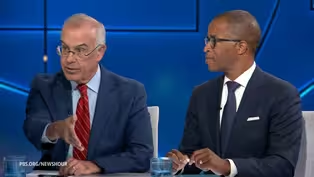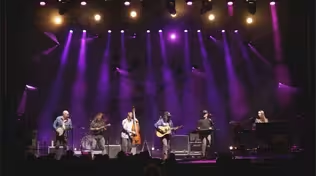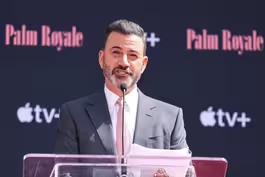
'We the People' explores the Constitution and its history
Clip: 9/19/2025 | 7m 18sVideo has Closed Captions
Historian Jill Lepore explores the Constitution and its interpretations in 'We the People'
Originalism is often countered by the idea that the Constitution is a living, breathing document meant to be interpreted and changed along with the times. Jill Lepore is a historian at Harvard University and author of the new book, “We the People: A History of the U.S. Constitution.” Geoff Bennett sat down with Lepore for our series, On Democracy.
Problems playing video? | Closed Captioning Feedback
Problems playing video? | Closed Captioning Feedback
Major corporate funding for the PBS News Hour is provided by BDO, BNSF, Consumer Cellular, American Cruise Lines, and Raymond James. Funding for the PBS NewsHour Weekend is provided by...

'We the People' explores the Constitution and its history
Clip: 9/19/2025 | 7m 18sVideo has Closed Captions
Originalism is often countered by the idea that the Constitution is a living, breathing document meant to be interpreted and changed along with the times. Jill Lepore is a historian at Harvard University and author of the new book, “We the People: A History of the U.S. Constitution.” Geoff Bennett sat down with Lepore for our series, On Democracy.
Problems playing video? | Closed Captioning Feedback
How to Watch PBS News Hour
PBS News Hour is available to stream on pbs.org and the free PBS App, available on iPhone, Apple TV, Android TV, Android smartphones, Amazon Fire TV, Amazon Fire Tablet, Roku, Samsung Smart TV, and Vizio.
Providing Support for PBS.org
Learn Moreabout PBS online sponsorshipWILLIAM BRANGHAM: Last night, we took an in-depth look at what's known as the originalist interpretation of the U.S.
Constitution.
Tonight, Geoff Bennett has a conversation with a historian who has a different view of America's most important governing document.
It's part of our On Democracy series about the range of perspectives about how our government should function, what led to this moment, and where the country goes next.
GEOFF BENNETT: Originalism is often countered by the idea that the Constitution is a living, breathing document meant to be interpreted and changed along with the times.
Jill Lepore is a historian at Harvard University and author of the new book "We the People: A History of the U.S.
Constitution."
And she joins us now.
Thanks for being with us.
JILL LEPORE, Harvard University: Oh, thanks so much for having me.
GEOFF BENNETT: Many conservatives, as you well know, they argue that the Constitution should be read exactly as it was written, or at least as the framers understood it in the late 18th century.
Why do you see that approach as flawed or even dangerous?
JILL LEPORE: Well, their approach is, I think, a good faith attempt to interpret the Constitution.
Originalism is a judicial philosophy.
I happen to disagree with it as a judicial philosophy, but, more importantly, I disagree that as a matter of history, in the sense that one of the fundamental claims of originalists is that originalism is original.
And the historical record suggested it very much is not.
You could still defend it.
You could still say, this is how I think we should interpret the Constitution, but I don't think you can successfully argue the claim that it is how the Constitution was originally intended to be interpreted.
GEOFF BENNETT: What do you say to those who argue that originalism provides stability and protects against judicial activism?
JILL LEPORE: Well, I think it's important to historicize originalism.
By that name, it doesn't emerge until 1980.
It really dates to 1971, when Robert Bork, who becomes the solicitor general and then later, of course, is nominated to the Supreme Court by Ronald Reagan, publishes a law review article in which he argues the principal positions of what become known in the 1980s as originalism.
So you have to ask yourself as a historian, right, originalism isn't original.
The framers didn't talk about constitutional interpretation in that way.
The documents that originalists say you must consult in order to interpret the Constitution correctly were not widely available until the 20th century.
I think most historians, including originalists, would suggest that originalists are responding to a very liberal Supreme Court that's very active, the Warren court, beginning with Brown v. Board of Education in 1954, which rules that segregated schooling is unconstitutional, through the privacy rulings we associate, Griswold v. Connecticut in '65, declaring that state laws banning contraception are unconstitutional, through Roe v. Wade in '73, that this active -- there's a lot of other things that the Warren court did.
But social and fiscal conservatives were out of power in those years in the sense that they didn't have spots on the Supreme Court.
And there were a few different ways to gain power over the way the Constitution was interpreted.
You could amend it.
And they tried to do that.
You could instead, though, try to take over the federal judiciary, which Reagan made an unprecedented number of judicial appointments, of course, entirely, within his powers in the 1980s.
And he applied a litmus test to those judges that they must subscribe to this new judicial philosophy that Bork had first described that they were seeking only to restore the original meaning, understanding and intent of the Constitution.
They were -- it is a judicial revolution.
And from that era forward, we have lived in an era where the court has had so much exclusive authority over constitutional change because we have stopped amending the Constitution.
GEOFF BENNETT: There are people who argue that the Constitution has lasted, has been enduring in large part because it is hard to change.
Do you see its rigidity as a strength or as an existential liability?
JILL LEPORE: I certainly don't think it's an existential liability.
(LAUGHTER) JILL LEPORE: I just -- this is not a language that I would use to describe most things, right?
GEOFF BENNETT: Certainly not the Constitution, but sure.
JILL LEPORE: I think that -- certainly not the Constitution.
I think the Constitution with its 27 amendments tells the story of American history.
One of the reasons I wrote the book is I think the philosophy of amendment is a very beautiful idea, the idea that we are fallible.
This is, of course, the famous speech that Benjamin Franklin gave.
I consent to this Constitution, sir, because I don't think it's the best, but I do not think we could do any better, and because I know that we're fallible, and there's got to be something wrong in it, but I also know that we can change it.
I think what troubles me, though, is that we really have abandoned that very idea of amendment, the idea that it is our Constitution and that we are the authors of it.
And by not changing it, we submit to possible abuses of constitutionalism.
And we submit to a political system in which the legitimacy of the Constitution is pretty easily questioned.
If a fundamental mechanism that was built into the Constitution that has never been written out of it is that the people have the capacity to amend it doesn't work, is the Constitution still working?
GEOFF BENNETT: There is this American reverence for the Constitution.
People almost hold it up as a sacred text.
Does that shape our collective unwillingness to change it, do you think?
JILL LEPORE: Yes, but I think we try to naturalize that and assume that it was ever thus.
That wasn't really the case.
Constitutional worship or kind of bringing the trappings of religious fundamentalism in particular to the Constitution, people often say, what would the founders do?
Well, they weren't called the founders until the progressive era and the rise of constitutional conservatism when they were deemed the founding fathers as a way to fight against progressive social reform.
So you're absolutely right that it is a feature of how Americans view the Constitution, but it is also a historical artifact of a moment in time.
The Constitution's history does not lie in the archives of the Supreme Court.
The Constitution's history lies in the hearts and minds of the American people, and that has been a long history of contestation and argument and division and union.
And it's a very rich tapestry, and it's very hard to see if we focus only on those moments across the chronology, the long 250 years since the first American Constitution in 1776, first state constitutions, if we focus only on the moments where this particular political passion that takes the form of worshiping the Constitution as sacred emerges.
GEOFF BENNETT: Jill Lepore, author of "We the People: A History of the U.S.
Constitution."
quite enjoyed speaking with you.
Thanks for being with us.
JILL LEPORE: Thank you.
Brooks and Capehart on censorship and authoritarianism
Video has Closed Captions
Clip: 9/19/2025 | 11m 18s | Brooks and Capehart on censorship and authoritarianism (11m 18s)
Festival helps musicians face industry’s mental health toll
Video has Closed Captions
Clip: 9/19/2025 | 9m 20s | Music festival helps artists confront and manage the industry’s mental health impact (9m 20s)
Self-censorship set dangerous precedent, FCC's Gomez says
Video has Closed Captions
Clip: 9/19/2025 | 6m 39s | Kimmel suspension and self-censorship set dangerous precedent, FCC commissioner says (6m 39s)
Stopgap measures to avoid government shutdown fail in Senate
Video has Closed Captions
Clip: 9/19/2025 | 3m 21s | Stopgap measures to avoid government shutdown fail in Senate (3m 21s)
What's in the U.S.-China deal for an American TikTok spinoff
Video has Closed Captions
Clip: 9/19/2025 | 8m 49s | What's in the U.S.-China deal for an American TikTok spinoff (8m 49s)
Providing Support for PBS.org
Learn Moreabout PBS online sponsorship
- News and Public Affairs

FRONTLINE is investigative journalism that questions, explains and changes our world.

- News and Public Affairs

Amanpour and Company features conversations with leaders and decision makers.












Support for PBS provided by:
Major corporate funding for the PBS News Hour is provided by BDO, BNSF, Consumer Cellular, American Cruise Lines, and Raymond James. Funding for the PBS NewsHour Weekend is provided by...





